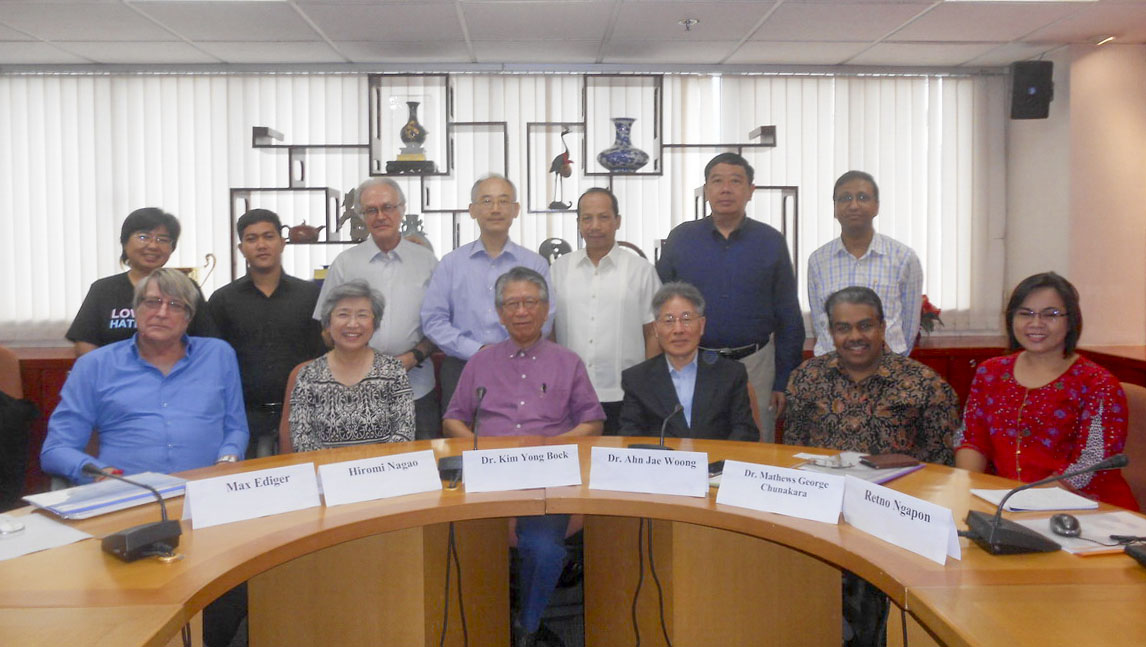Consultation on Re-Envisioning ICF Mission & Objectives
Last Updated (Tuesday, 11 October 2016 14:17)

The Interfaith Cooperation Forum had recently organized a Consultation on Re-envisioning the mission and objectives of ICF. This was held in Hong Kong at the conference room of the Chinese YMCA of Hong Kong during 27-29 September 2016.
A total of 13 delegates, representing Christian Conference of Asia, Asia and Pacific Alliance of YMCA, Interfaith Cooperation Forum and distinguished resource persons participated at the consultation. Dr. Mathews George Chunakara led the CCA delegation, Mr. Nam Boo Won led the APAY Delegation and Mr. Max Ediger led the ICF delegation. Beside them, Dr. Kim Yong Bock from Korea presented the keynote address and moderated the consultation while Dr. Ahn Jae Woong, former General Secretary of the CCA and one of the founders of ICF shared his experiences about the founding of ICF. Dr. Abubacar M. Datumanong a prominent Islamic scholar from southern Philippines and Ms. Anne Lapapan Supamanta a Buddhist scholar from Thailand also participated at the consultation and shared peace initiatives from their respective religious perspectives.
Dr. Kim Yong Bock in his paper “Towards a Common Vision of Peace for Life Together - How a Convergence of Faiths Can Make Peace from Below ” pointed out that “ In a world where the term “security” has become a synonym for protecting the elites in their pursuit of economic gains at the expense of human and ecological communities, and often by military and paramilitary means, activists have been increasingly emphasizing the need to advocate for a new international political paradigm: security for all people. “
He further reiterated that “Peace Pedagogy is our method for discussing and planning future movements of peacemaking in Asia, from local, national and transnational perspectives”.
Dr. Ahn Jae Woong in his paper went down through the memory lane, describing the first interfaith consultation held under the auspices of the CCA and APAY at Prapat, Indonesia, during 5-10 April, 2003. There were 37 participants from 14 Asian countries from various religious background who meet together to prepare the Asian response of the aftermath of 9/11. The fruit of this consultation was the formation of the Interfaith Cooperation Forum which has been successfully involved in mobilizing peace advocacy programs in various parts of Asia for the last 12 years through training youth enthusiasts, at places where peace is at threat .
Interfaith Cooperation Forum (ICF) is a joint initiative of Asia and Pacific Alliance of YMCAs and Christian Conference of Asia, launched in the year 2004. The objective of ICF is to build up a regional network of individuals and groups from different religions who are committed to working for an interfaith movement for justice and peace. ICF holds regular programs in which regional interfaith activities take place focused on justice and peace issues.
After 12 years of operation, ICF, with respect for its good achievements to date, have now come to a threshold, where the need has been felt for more integration of ICF activities with the constituencies of the project holders, the CCA and APAY. The involvement of the constituencies of the project holders could bring more effectiveness in the program activities of ICF. The thrust of ICF is how the ecumenical organizations could go beyond the ecumenical circle, reach out in the interfaith sphere and work effectively in bringing out peace with justice in this volatile world. As we live in a pluralistic society, all our peace effects should be of inclusive approach beyond our own circles. The rich experience of ICF in the peace building efforts could be a great help in this regard.
During the consultation the participants engaged themselves in brainstorming sessions in the quest of re-envisioning the mission and objectives of the ICF keeping in mind the original objectives of ICF. The consultation concluded with fresh recommendation to transform the ICF to a regional inter-religious platform which will be able to address local and regional peace issues in a more effective manner.
Duncan Chowdhury
